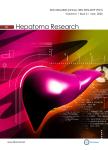Detection of urine DNA markers for monitoring recurrent hepatocellular carcinoma
Detection of urine DNA markers for monitoring recurrent hepatocellular carcinoma作者机构:Liver Disease Prevention CenterDivision of Gastroenterology and HepatologyThomas Jefferson University HospitalPhiladelphiaPA19107USA JBS ScienceInc.DoylestownPA18902USA The Baruch S.Blumberg InstituteDoylestownPA18902USA.
出 版 物:《Hepatoma Research》 (肝癌研究(英文版))
年 卷 期:2017年第3卷第6期
页 面:105-111页
学科分类:1002[医学-临床医学] 100214[医学-肿瘤学] 10[医学]
基 金:This work has been supported by the National Institute of Health R44 CA165312 RO1 CA202769 and R43 CA192507
主 题:Hepatocellular carcinoma recurrence circulating-tumor DNA liver cancer biomarker urine tumor marker hepatitis B virus
摘 要:Aim: This study aimed to explore the potential of detecting hepatocellular carcinoma (HCC)-associated DNA markers, TP53249T mutations and aberrant methylation of RASSF1A and GSTP1 genes, for monitoring HCC recurrence. HCC remains a leading cause of death worldwide, with one of the fastest growing incidence rates in the US. While treatment options are available and new ones emerging, there remains a poor prognosis of this disease mostly due to its late diagnosis and high recurrence rate. Although there are no specific guidelines addressing how HCC recurrence should be monitored, recurrence is usually monitored by serum-alpha fetal protein and imaging methods such as magnetic resonance imaging (MRI). However, early detection of recurrent HCC remains limited, particularly at the site of treated lesion. Methods: Here, the authors followed 10 patients that were treated for a primary HCC, and monitored for months or years later. At these follow-up visits, urine was collected and tested retrospectively for 3 DNA biomarkers that associate with HCC development. Results:This 10-patient study compared detection of urine DNA markers with MRI for monitoring HCC recurrence. Five patients were confirmed by MRI for recurrence, and all 5 had detectable DNA biomarkers up to 9 months before recurrence confirmation by MRI. Conclusion:Overall, this suggests that detection of HCC-associated DNA markers in urine could provide a promising tool to complement detection of recurrent HCC by imaging.



